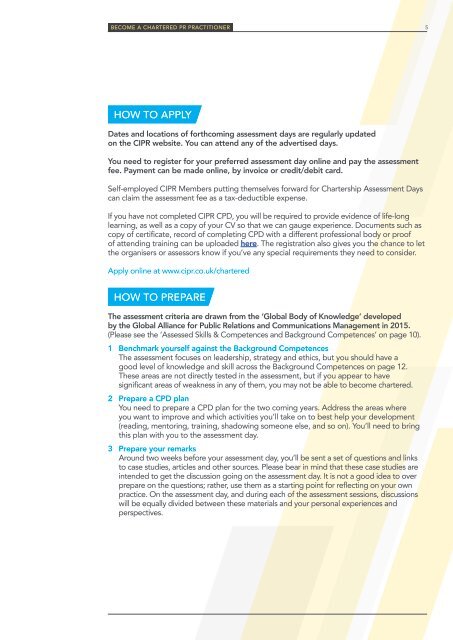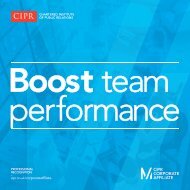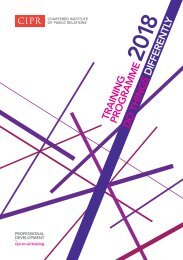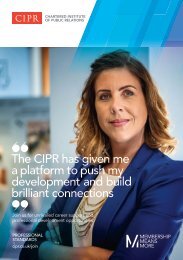Guide to Chartered 2018
You also want an ePaper? Increase the reach of your titles
YUMPU automatically turns print PDFs into web optimized ePapers that Google loves.
BECOME A CHARTERED PR PRACTITIONER 5<br />
HOW TO APPLY<br />
Dates and locations of forthcoming assessment days are regularly updated<br />
on the CIPR website. You can attend any of the advertised days.<br />
You need <strong>to</strong> register for your preferred assessment day online and pay the assessment<br />
fee. Payment can be made online, by invoice or credit/debit card.<br />
Self-employed CIPR Members putting themselves forward for Chartership Assessment Days<br />
can claim the assessment fee as a tax-deductible expense.<br />
If you have not completed CIPR CPD, you will be required <strong>to</strong> provide evidence of life-long<br />
learning, as well as a copy of your CV so that we can gauge experience. Documents such as<br />
copy of certificate, record of completing CPD with a different professional body or proof<br />
of attending training can be uploaded here. The registration also gives you the chance <strong>to</strong> let<br />
the organisers or assessors know if you’ve any special requirements they need <strong>to</strong> consider.<br />
Apply online at www.cipr.co.uk/chartered<br />
HOW TO PREPARE<br />
The assessment criteria are drawn from the ‘Global Body of Knowledge’ developed<br />
by the Global Alliance for Public Relations and Communications Management in 2015.<br />
(Please see the ‘Assessed Skills & Competences and Background Competences’ on page 10).<br />
1 Benchmark yourself against the Background Competences<br />
The assessment focuses on leadership, strategy and ethics, but you should have a<br />
good level of knowledge and skill across the Background Competences on page 12.<br />
These areas are not directly tested in the assessment, but if you appear <strong>to</strong> have<br />
significant areas of weakness in any of them, you may not be able <strong>to</strong> become chartered.<br />
2 Prepare a CPD plan<br />
You need <strong>to</strong> prepare a CPD plan for the two coming years. Address the areas where<br />
you want <strong>to</strong> improve and which activities you’ll take on <strong>to</strong> best help your development<br />
(reading, men<strong>to</strong>ring, training, shadowing someone else, and so on). You’ll need <strong>to</strong> bring<br />
this plan with you <strong>to</strong> the assessment day.<br />
3 Prepare your remarks<br />
Around two weeks before your assessment day, you’ll be sent a set of questions and links<br />
<strong>to</strong> case studies, articles and other sources. Please bear in mind that these case studies are<br />
intended <strong>to</strong> get the discussion going on the assessment day. It is not a good idea <strong>to</strong> over<br />
prepare on the questions; rather, use them as a starting point for reflecting on your own<br />
practice. On the assessment day, and during each of the assessment sessions, discussions<br />
will be equally divided between these materials and your personal experiences and<br />
perspectives.









